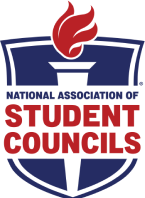Where it is allowed by their school districts, middle level and high school student councils regularly select and support charities of choice through fundraising efforts. Before committing funds or fundraising efforts to any group, it is always best to verify the position and policies of the school district and secure principal approval.
The number of organizations competing for student council support has been rising. Many organizations offer resources to help student groups sponsor events in the name of the charity or cause.
NatStuCo reminds student council advisers to help student leaders understand how to best determine choosing a group to support.
Research
Examine the background of charities.
- Use consumer websites.
- Ask groups for references of local businesses, persons, or schools that can vouch for their legitimacy. Also check the Better Business Bureau, a local Chamber of Commerce, and the county government offices. Reluctance or refusal to provide references should alert student leaders and advisers to dig further before making any commitments. See also the sidebar and the tip list that follows.
- Look for signs that might raise questions. An obvious red flag is any organization that does not respond to inquiries or whose personnel give vague responses or conflicting information.
Guiding student leaders through the process of checking an organization’s background includes helping them establish a standard, thorough review process before a decision is made. Review all findings with the adviser and principal—a must as part of that process.
Tips for Background Checking
NatStuCo has developed the following tips to help members when confronted with solicitations from unknown organizations.
- A key method for getting people to support a cause is to appeal to either their emotions or their patriotism. Surges in “new” charities are common following a natural catastrophe or a traumatic event having widespread or international impact. Be wary.
- Before entering into any agreement with an unfamiliar charitable organization, contact one or more consumer service groups to ascertain its validity and record of operation. Also, check your state office of consumer affairs or state attorney general’s website.
- Actually call the charity. The call is an excellent way to find out any information that was not included in earlier contacts or mailings from the group. Red flag: Be wary of organizations if your calls go unanswered, messages are not returned, or if the number is out of service or simply incorrect.
- Ask for and check references. If the group has representatives in your area, invite them in to make a presentation to the council.
- If the charity will receive money, find out how much actually goes to the recipients. Some charities may channel funds through a system that results in most of the money going to pay business expenses or to individuals who run the charity. See sidebar for evaluation services.
- There may come a time when your council receives invitations from two groups whose names are almost identical. Be especially prudent in researching both. Phony organizations will often use a similar name or creating mailings or webpages that have confusingly similar appearances. Do not hesitate to call an organization to verify its name when this circumstance arises.
- Learn and understand all costs that may be associated with sponsoring any event or activity on behalf of a charity and budget accordingly.
- Some charities feature special events, such as walk-a-thons, etc. Such activities usually have expenses associated with them that the charity usually expects the event sponsor to cover. For a student council to host the event without significant additional financial support, the final price tag on the event could wind up being larger than the council’s actual donation to the charity.
- Refuse high-pressure solicitations. In their zealous efforts to secure funding, some charity solicitations employ high-pressure tactics to rush student councils into agreements. Be cautious of groups being aggressive in soliciting the student council or trying to rush the council into an agreement. The Federal Trade Commission has identified this as a tactic typically used in scams. If advisers or student leaders encounter such tactics, and the organization won’t back off, the best policy is to politely decline and end communication with that group.
- The Federal Trade Commission advises to always be alert to a charity that offers to send a courier to collect a donation immediately after the fundraising event. Cash and other donations should be deposited in the school’s account and then a check written to the charity on behalf of the student council.
- Invite a representative of a charity organization to attend your activity or visit the school to accept the donation. This is a good PR opportunity for the council, the school, and the charity. If a representative is able to be present, the council can create an oversized check that will be used as a stage prop to represent the donation in a presentation. It looks better in photos and doesn’t compromise the secure process of mailing a check directly to the charity.
